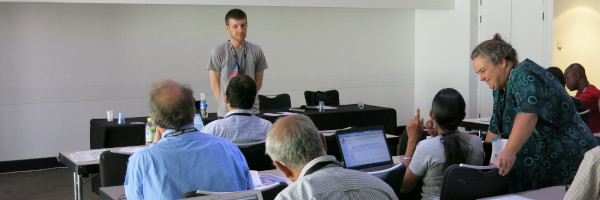| Wellbeing
|

|
|
|
| Sectors |
Wellbeing
|
| Contact |
Wilfred Pinfold
|
| Topics |
|
Activities

|
|
CyberCity Education Platform
|
# Expand upon an existing NSF CICI grant at GW to extend regional access to the Michigan Cyber Range over CAAREN (100 Gbps DWDM network interconnected with Internet2) and develop enhanced real-world training environments using an advanced software defined multi-service exchange (MSX) technology.
- Establish a city-wide cyber representation of the IT infrastructure, underlying operational work flows, utilities management, emergency services and administrative operations as a platform for cybersecurity training in offensive and defensive tactics.
- Provide customizable courses and training practicum that can be configured to mimic the systems being tested by teams of cybersecurity engineers and their non-technical managers.
|
|
|

|
|
DC Asset Management Lab at the University of the District of Columbia
|
| DC Government desires dramatic benefits through the use of the ISO 55000 management system for asset management and asset visualization tools and processes piloted through the U.S. Federal Government. The Lab allows a series of DC Government problems to be addressed in a 4-week workshop requiring 20 total hours that points to publicly available solution sets that can be deployed by DC or any other municipality that sends students to courses.
|
|
|

|
|
Equity in Cybersecurity Training - A New Collaborative Pilot in Chicago
|
| AnitaB.org and ISACA (the Information Systems Audit and Control Association), under the support of the Connect Chicago program, aim to create an accessible cybersecurity training program that can help close the skills gap. Out team will offer training and workforce opportunities for women in underrepresented communities in Chicago. Our program will take them through skills training in a cohort environment with mentorship, role models, and career advancement available. This pilot program is supported by the Connect Chicago Innovation Program, a fund managed by the City Tech Collaborative in partnership with philanthropy, industry, and the City of Chicago.
|
|
|

|
|
Global Organization of Smart Cities GO SMART
|
* Currently many cities in the world are facing similar challenges and have therefore developed their own Smart City strategy and are running their own Smart City projects. Considering the similarity of the challenges, there lies huge potential in effective knowledge exchange and collaboration.
- GO SMART aims to facilitate collaboration and knowledge exchange between Smart Cities, by means of one-on-one matchmaking, opportunity reports and workshops.
|
|
|

|
|
SMART Emergency Medical and First Response Multiteam Systems
|
SMART Emergency Medical Teams will help inter-disciplinary teams improve transition-of-care quality, promote situational awareness, and enhance the efficacy of simulation debriefing.
- Simulation-based Team Training in medical contexts
- Patient hand-off or transitions between sub-teams
- Interaction among interdisciplinary roles/team
- Wearable sensors
- Enhanced debrief –visualization/display/feedback
- Collaborative reflection, situation awareness and experiential learning
|
|
|

|
|
Smart City Diaries TV Video Series
|
| Smart City Diaries is a documentary television and podcast series that showcases the phenomenon of digital transformation in small and large cities in the developed and developing world. Destination cities will have undertaken smart city initiatives to transform the way they manage their city operations and provide information and services to their residents. Each city has unique physical, social and cultural qualities; the series highlights individuals across cultures to understand how rapidly changing technologies impact how they live, work, play and learn.
The series will be hosted by a mother and daughter team: Deborah Acosta and Anna Acosta. Their perspectives differ as do their attitudes and levels of comfort with new technologies: one is a baby boomer, the other a millennial. One was CIO for a small California city, the other is a musician, songwriter, social justice blogger and social media expert. They are both smart and sassy, ready to explore a range of cities and the people who are impacted by smart city digital transformations. Through the eyes of these two women, each episode reveals how unique locations approach meeting the quality-of-life demands of residents, businesses and visitors through increased use of technology in an era of the Internet of Things, shifting populations and shrinking budgets and resources.
|
|
|

|
|
The Inclusive Smart City
|
| An AI-augmented skills-based jobs placement programme by the Singapore infocomm Technology Federation (SiTF) to help mature and displaced workers transition effectively into the tech sector. The programme will be a combination of AI tools and high-touch engagements to drive outcomes.
This effort is also integrated into a larger national initiative called TeSA (TechSkills Accelerator) to improve the employability of Singaporeans and to meet the demand for skilled tech workforce by different industries across the economy. TeSA involves key industry and employer associations, tech companies in different sectors of the economy, key enterprise users of technology in different industries, government agencies both economic and regulatory ones, labour unions, students and professionals. TeSA is steered through a national Governing Council and various Sector Committees representing different industries. TeSA is led by the Infocomm Media Development Authority of Singapore (IMDA), with other partner agencies.
Both TeSA and talentguru AI-driven platform have been launched. New efforts are being developed and launched on an on-going basis.
|
|
|

|
|
World Digital School
|
| Cities and communities around the world are entering the next era of transformational change in which citizens and their surrounding natural and built environments are increasingly connected by digital technologies. In the coming digital industrial revolution, technology will widen the playing field to include greater participation of individuals and ideas from all walks of life as we reinvent who and what we are. These technologies not only have the potential to build a more inclusive community, but when thoughtfully applied could help realize greater socio-economic gains. Conversely, if these technologies are not available to all, we would fragment our communities more than they are today.
Smart Cities are %90 sociology and %10 infrastructure.
|
|
|
|
- Authors

Education and training refers to the process of acquiring knowledge, skills, values, beliefs, and habits through various methods such as teaching, research, and self-study.
Education is typically provided through formal institutions such as schools and universities, while training is typically provided through vocational or professional development programs.
Education generally focuses on the acquisition of knowledge and skills that are considered necessary for personal development, social integration, and active citizenship. It can also help to foster critical thinking, problem-solving, and decision-making skills.
Training, on the other hand, is typically more focused on providing individuals with the skills and knowledge needed to perform a specific job or occupation. It can include both on-the-job training and off-the-job training, such as vocational training programs or professional development courses.
Both education and training are essential for personal growth and development, as well as for the economic and social development of a community. They help individuals to improve their employability, become more productive and innovative, and make a positive contribution to society. There are many different types of education and training that can be grouped into several main categories. Some examples include:
- Formal education: This type of education takes place in a classroom setting and is typically provided by a school or educational institution. Formal education includes primary, secondary and higher education.
- Non-formal education: This type of education takes place outside of a traditional classroom setting and is not typically provided by a school or educational institution. Examples include adult education classes, community education programs, and online courses.
- Informal education: This type of education occurs through everyday experiences, such as learning from family members and friends, reading, and observing the world around us.
- Vocational training: This type of training focuses on providing individuals with the skills and knowledge needed to perform a specific occupation or trade, such as plumbing, welding, or healthcare.
- Professional development: This type of training is designed to help professionals improve their skills and knowledge in their field, and can include workshops, seminars, and online courses.
- Technical training: This type of training focuses on providing individuals with the technical skills and knowledge needed to perform a specific job or task, such as computer programming or machinery operation.
- Language education: This type of education focuses on teaching individuals a new language, including reading, writing and speaking.
- Online education: This type of education is delivered through the internet and includes a wide range of options, from online degree programs to MOOCs (Massive Open Online Courses) and other short-term courses.
All these different types of education and training have different purposes and goals, but they all aim to provide individuals with the knowledge and skills needed to improve their lives and contribute to the community.









